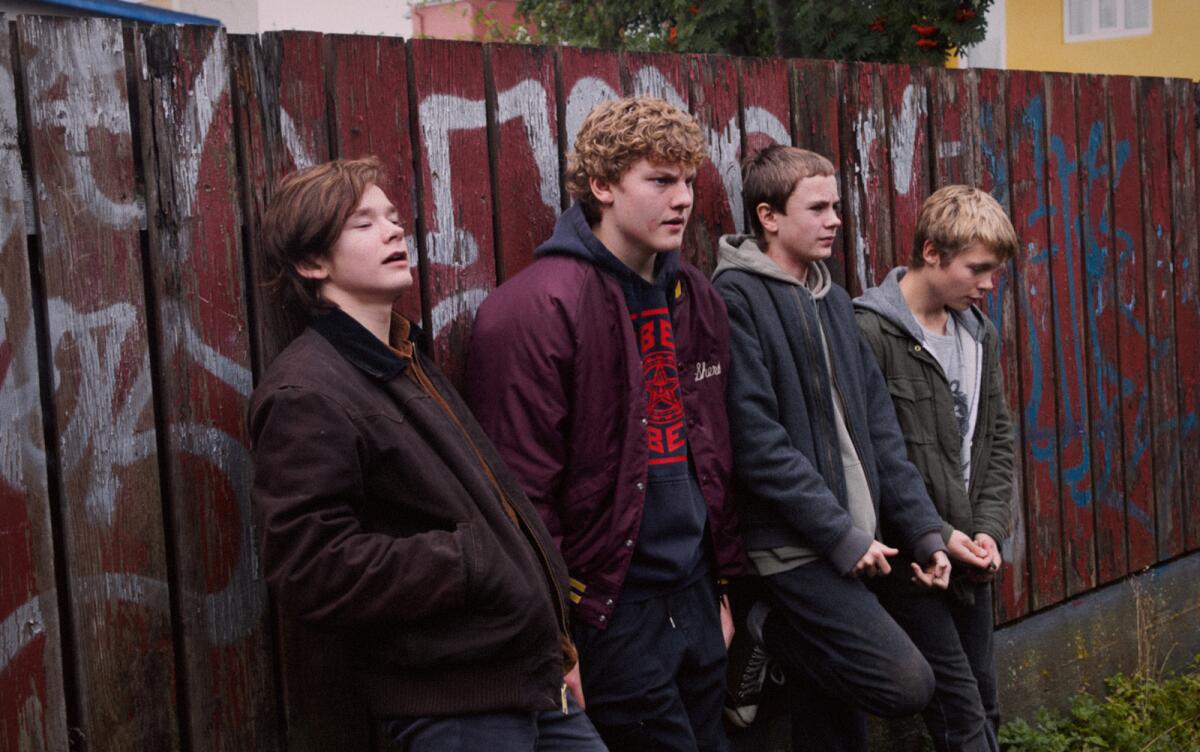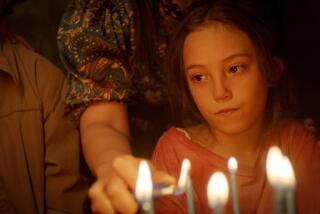Review: âBeautiful Beingsâ balances the brutality and tenderness of teen adolescence

In much the way youâre never really prepared for the bursts of violence and abuse in the Icelandic drama âBeautiful Beings,â about a quartet of wayward teenage boys from broken homes, youâre also shocked by their moments of tenderness toward each other, like the strange flower nestled in cracked pavement that both beautifies and intensifies its unlikely location.
Such is the seesawing mood of hair-trigger adolescent sensitivity â to smash, or to cry â that writer-director GuĂ°mundur Arnar GuĂ°mundsson seeks to explore with his mostly arresting second film , which is also his second feature about the inner lives of kids (2016âs âHeartstoneâ). An often tense release-valve scenario flecked with moments of dream imagery and lyrical naturalism, âBeautiful Beingsâ certainly positions GuĂ°mundsson as one of the more thoughtful chroniclers of the awkward age, even if he never quite knows how to corral his many moods into something wholly resonant about the nihilistic trap of delinquency. (The film was Icelandâs submission this year for the international film Oscar, but didnât make the shortlist.)
For your safety
The Times is committed to reviewing theatrical film releases during the COVID-19 pandemic. Because moviegoing carries risks during this time, we remind readers to follow health and safety guidelines as outlined by the CDC and local health officials.
Narrating our way in is Addi (Birgir Dagur Bjarkason), a sharp-eyed, wiry blond who runs in a misfit trio that includes goofy, bratty Siggi (Snorri Rafn FrĂmannsson) and hot-headed hooligan-in-training Konni (Viktor BenĂłnĂ˝ Benediktsson), whose go-to reaction is punching. After seeing a news report about a relentlessly bullied schoolmate recovering from an assault, Addi finds himself drawn to said kid, Baldur (Ăskell Einar PĂĄlmason), introduced to us separately as a scrawny loner living in squalor with an often-absent mother (ĂsgerĂ°ur GunnarsdĂłttir). To the astonishment of his mates, Addi invites âBalliâ to hang with them.
It could be out of boredom, or because even a pathetic outcastâs parent-less pigsty is a better place to congregate than their own undesirable homes â and nervous, jittery Balli endures plenty humiliation from the others before he feels comfortable. But we sense Addi is at a stage where an extended gesture of potential friendship is of greater interest to him than getting into one more bloody scrap with other kids (usually spurred by Konniâs terrifying behavior). Besides, after years of rolling his eyes at the clairvoyant ramblings of his attentive but mentally troubled single mom (AnĂta Briem), Addi has begun having his own strange visions: a dream of domestic peace, or a glimpse at the futureâs potential violence, but sometimes just an ominous black smoke lurking in the corner.
The supernatural interludes arenât nearly as effective, however, as the more thickly present scenes of hormonal restlessness and intuitive socialization: shared cigarettes, stupid humor, lit fuses that are better off extinguished (there are some gnarly, pulse-quickening melees), and those moments of affection â helping Balli look presentable, calming Konni â that suggest theyâre inching toward figuring something out about the cusp of adulthood.
The pacing is sometimes shaggy, and the boysâ motivations are occasionally mysterious, but GuĂ°mundssonâs young actors are magnetic in a physical, haunted way, and the talented Norwegian cinematographer Sturla Brandth Grøvlen finds a dankness of texture and color that punctuates everything from sweat and light on pasty skin to the general grey/green gloom of the boysâ neighborhood.
As for how GuĂ°mundsson handles the storyâs more brutal turns, itâs hard not to sense the whiff of trauma as sensationalistic, even if the performances (especially Benediktssonâs and PĂĄlmasonâs) are solid enough to do the necessary heavy lifting. Some cruelties in wretched lives donât need explicitness for us to grasp their impact. And in the case of the reappearance of Balliâs abusive stepfather Svenni (a commanding Ălafur Darri Ălafsson), which shakes up the molecules in that house and among the boys, a deterministic plotting regrettably takes over in the last half hour. Until that point, âBeautiful Beingsâ and its unhurried atmosphere of caring realism had been doing quite well without it.
'Beautiful Beings'
In Icelandic with English subtitles
Not rated
Running time: 2 hours, 3 minutes
Playing: Starts Jan. 20, Laemmle Glendale
More to Read
Only good movies
Get the Indie Focus newsletter, Mark Olsen's weekly guide to the world of cinema.
You may occasionally receive promotional content from the Los Angeles Times.










